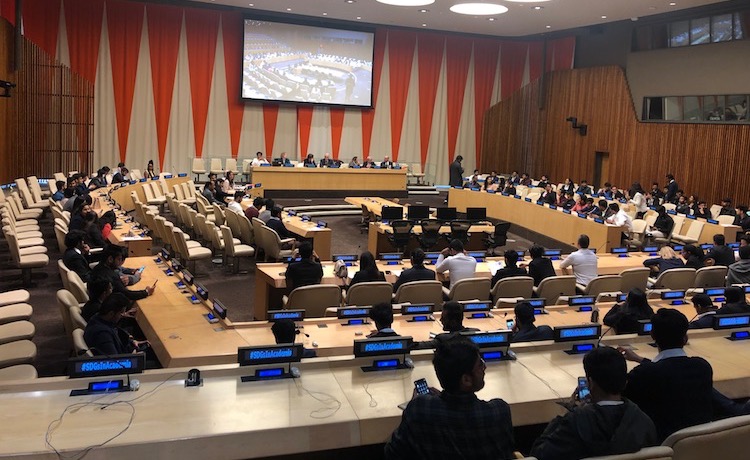By Santo D. Banerjee
NEW YORK (IDN) – A vibrant and diverse network of students, academics, scientists, researchers, think tanks, and institutions of higher education around the world, serve as incubators of new ideas, inventions and solutions to diverse global challenges, and are therefore vital to achieving the Sustainable Development Goals (SDGs).
The United Nations Academic Impact (UNAI), says its Chief, Ramu Damodaran, aligns these institutions with the United Nations in supporting and contributing to the realization of the Organization’s goals and mandates, including the promotion and protection of human rights, access to education, sustainability and conflict resolution.
‘Unlocking Your Emotions to Achieve the SDGs‘ was off-the-beat theme of a conference the UNAI hosted on May 17 at the UN Headquarters in New York in which experts in the fields of emotional intelligence, mindfulness and nonviolent communication explained how these tools could be deployed in education and used to help achieve a more peaceful and prosperous world.
The conference discussed several intersections between the skills emotional intelligence can provide and how these can be deployed to reach common goals such as the 2030 Agenda for Sustainable Development. Daniel Goleman, author of the bestselling book Emotional Intelligence, provided audience with an overview of what emotional intelligence means, its benefits and how people can cultivate it in their own lives.
Goleman also noted that emotional intelligence skills are key to the jobs of the future and a better predictor of work place success than IQ and other measures of intelligence. “After I wrote Emotional Intelligence I looked at more than a hundred competence models from corporations, NGOs and governments and I found out that the common set of abilities that identified people who were outstanding had nothing to do with cognitive abilities, but with emotional intelligence,” he noted.
Michele Nevarez, head of Daniel Goleman Emotional Intelligence Coaching and Training Programs for Key Step Media, led an interactive segment that introduced to participants practices to strengthen emotional intelligence and self-awareness on a day to day basis.
The NGO community and education sector are not the only groups who can benefit from the techniques of mindfulness, nonviolent communication and emotional intelligence. Businesses are key contributors to realizing the SDGs.
Rich Fernandez, CEO of the Search Inside Yourself Leadership Institute, walked audience members through the work that is happening in the private sector in terms of teaching employees these skills, business leaders who are developing their knowledge in this area and how this can be leveraged to advance the global community’s work on the SDGs.
Fernandez noted that companies were no longer “primarily concerned with their internal metrics around shareholder value add, they’re much more concerned now with stakeholder value add trying to make an impact in the world in a larger ecosystem with an external focus.” He noted that this new focus of many companies on social good and not just increasing profits could be harnessed in service of the SDGs.
Participants attending the conference were also given a firsthand account of what happens when emotional intelligence is underutilized in society and how it can be used to help people recover from traumatic experiences. Liliane Umuhoza, a survivor of the 1994 genocide in Rwanda, gave a moving account of what it was like to lose her father and other family members during a time in which an estimated 1 million people were killed in one month.
She described the emotional issues she began to confront in her teens as she tried to come to terms with what she, her family, and her country had experienced and how being introduced to emotional intelligence to cope with trauma changed the course of her life. She went on to set up the Women Genocide Survivors Retreat, a program that helps women who suffered from rape during the Rwandan genocide process their feelings and help in the healing and reconciliation process.
The speakers’ interventions were all relevant to the work of the United Nations as they provided a lens through which to view the work of the Organization and ways to increase collaboration among peoples and countries.
Nonviolent Communication expert Alan Seid provided insight into the value of nonviolent communication which is based on understanding your emotions and motivations as well as understanding the emotions of others to have meaningful and impactful dialogue rooted in empathy and caring for the needs of others. When put into practice, nonviolent communication can improve interpersonal relationships, organizational performance and more just and sustainable communities, Seid said.
The participants also heard Chris Ruane, a member of the British Parliament since 1997 and founder of the Mindfulness All Party Parliamentary Group (MAPPG), a cross-party group dedicated to developing public policy on mindfulness in health, education, criminal justice, and the workplace, who has put the techniques of mindfulness into practice with lawmakers and within governmental bodies.
The presentations and interactive sessions were followed by a moderated panel discussion with questions from the audience about a range of issues including the role of emotional intelligence in artificial intelligence, how to implement this tools in a digital world in which people communicated largely via platforms and not in real life, and concrete actions people could undertake to implement mindfulness in their lives, offices and organizations once they left the conference. [IDN-InDepthNews – 31 May 2019]
Photo: A glimpse of the UNAI conference. Credit: The International Studies Association (ISA)
IDN is flagship agency of the International Press Syndicate.
facebook.com/IDN.GoingDeeper – twitter.com/InDepthNews
Send your comment: comment@indepthnews.colo.ba.be
Subscribe to IDN Newsletter: newsletter@indepthnews.colo.ba.be

